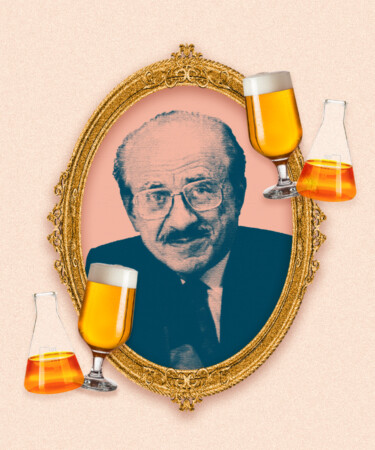Charged with being bland and unpleasant, the light beer category is not the most popular among beer enthusiasts and craft beer geeks. However, there was a time when low-calorie beers were truly revolutionary, and there’s no denying the huge impact they’ve had on the category at large. All of that is thanks to one brilliant man: Joseph Owades.
Born in 1919 to immigrant parents from Ukraine, Owades (pronounced oh-WAY-dees) almost single-handedly changed the modern American beer landscape. After learning how many people were put off by the nutritional value of beer, he set out to create a beverage that was just as tasty with fewer calories. Through his experiments as a biochemist, he developed a method that allowed yeast to further break down the starches in the beverage, reducing its calorie and carb content. The result was a low-cal or “diet” version of beer that appealed to more health-conscious drinkers and etched Owades’s name in history forever.
Owades was raised in the Bronx and became fascinated with science after receiving a chemistry set from his mother at the age of eight. Little did she know her gesture would shape the rest of his life. In 1939, Owades graduated from City College of New York with a bachelor’s degree in chemistry. He then went on to obtain both his master’s and doctorate in biochemistry from Brooklyn Polytechnic Institute, working during the day and taking classes in the evening.
Upon graduation, he began a post-doctoral position at Fleischmann’s Yeast, a popular manufacturer of commercial yeast, where he started working in fermentation science. Though his initial interest was in the study of cholesterol, Owades soon switched his attention to yeast full-time, taking a job at Schwarz Laboratories, which specialized in developing the product for foods and beverages.
In the 1960s, he began experimenting with a process for creating a low-calorie beer after learning just how many people were concerned about gaining weight from consuming the beverage. After moving to Rheingold Brewery, which was based in Brooklyn, Owades debuted his first project, “Gablinger’s Diet Beer,” in 1967. Despite being a successful experiment in reducing the beverage’s calories, the beer itself didn’t gain much attention due to poor marketing and its underwhelming name. So, upon getting approval from his boss, Owades shared the recipe with a friend at Meister Brau brewery. Later, the Chicago-based brewery relaunched the beer under the new name Meister Brau Lite.
On the brink of bankruptcy, Mesiter Brau brewery was acquired by Miller Brewing in 1972, which then began mass-producing a reformulated version of Owades’s low-cal creation. It was renamed Miller Lite and marketed to a specific sector of customers: blue-collar men looking to enjoy the taste of beer without the calories.
With proper marketing and the catchy slogan “tastes great, less filling,” Miller Lite soon began dominating the U.S. beer market.
The Miller Lite rebrand of Owades’s invention created a new category in the industry and a growing market for American drinkers craving light beer. Soon after, Owades founded the Center for Brewing Studies in Sonoma to further his work in fermentation. Through this venture, he continued to impart his knowledge by serving as a mentor for microbrewers who would later become craft beer pioneers, such as Jim Koch who founded the Boston Brewery. Owades helped commercialize Samuel Adams Lager, which was allegedly inspired by a Koch family recipe. He also served as a consultant, aiding in the development of formulas for other notable breweries, such as New Amsterdam Beer, Anchor Steam, Foggy Bottom Beer, and Pete’s Wicked Ale.
To date, Owades is credited as the founding father and inventor of light beer, has authored many technical journals, owns several patents, and is held as an esteemed contributor to the brewing industry. His contribution to beer was unprecedented and his passing in 2005 marked the loss of one of the most important, yet often overlooked, individuals in the modern history of beer.
